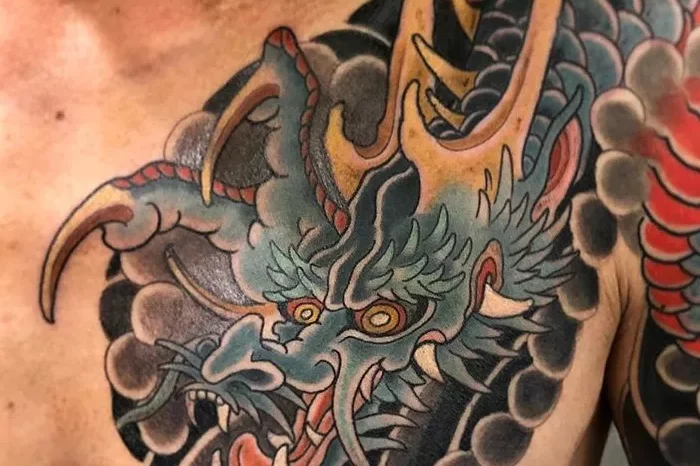Dragon tattoos have been a popular choice for body art enthusiasts for generations, admired not only for their intricate and striking designs but also for their deep-rooted symbolism. From ancient myths to modern interpretations, the dragon embodies a range of meanings that resonate with people from various cultures. This creature’s powerful image evokes themes of strength, wisdom, and mysticism, making it a compelling tattoo choice for those who wish to express a rich narrative through body art.
This article will explore the significance behind dragon tattoos, focusing on the symbolism associated with these mythical creatures. We will delve into various cultural interpretations, such as the Eastern and Western perspectives, as well as the nuanced meanings behind different depictions and poses of dragon tattoos. Understanding these interpretations can provide profound insights for anyone considering a dragon tattoo and for those interested in tattoo symbolism as a whole.
The Eastern Dragon: Symbol of Power and Wisdom
In Eastern cultures, particularly in China and Japan, dragons are revered as powerful and benevolent beings. Unlike their Western counterparts, which are often depicted as malevolent and dangerous, Eastern dragons are symbols of prosperity, strength, and wisdom. In traditional Chinese culture, the dragon is an auspicious symbol that embodies the concept of Qi—the vital life force that sustains all living beings. This representation connects the dragon to life, growth, and positive energy.
In Japanese folklore, dragons also signify strength and protection, but with a unique spiritual twist. Japanese dragons are often portrayed with three toes and are associated with water, which makes them symbols of adaptability and fluidity. They are believed to guard the heavens and waterways, ensuring harmony and balance in nature. For many individuals choosing a dragon tattoo inspired by Eastern art, it represents a commitment to strength, wisdom, and the pursuit of inner balance.
The Western Dragon: Power and Ferocity
The symbolism of dragons in Western culture takes on a different tone compared to their Eastern counterparts. In Western mythology, dragons are frequently portrayed as formidable and dangerous beasts, often guarding treasures and breathing fire. These dragons symbolize power, destruction, and chaos. However, their presence also signifies bravery and heroism, as tales often depict knights and warriors battling dragons to prove their strength and courage.
When depicted in tattoos, Western-style dragons can represent a combination of power and defiance. For those who choose such tattoos, the imagery may convey a sense of inner strength, an indomitable spirit, or a rebellious nature. A Western dragon tattoo is often seen as a testament to overcoming challenges or standing strong in the face of adversity.
Symbolism by Dragon Color and Pose
The meaning behind dragon tattoos can vary significantly based on the color and posture of the dragon depicted. For instance, in Eastern traditions, the color of the dragon often holds symbolic significance:
Black Dragon: Represents wisdom and experience. Often chosen by those who view themselves as wise beyond their years or have overcome significant life challenges.
Red Dragon: Symbolizes strength and passion. A red dragon tattoo can indicate a fierce, determined personality or an intense love for life.
Gold Dragon: Embodies prosperity, wealth, and good fortune. Choosing a gold dragon may symbolize a desire for success and abundance.
Green Dragon: Associated with nature and the earth, symbolizing life and growth. A green dragon tattoo can indicate a close connection to nature or a commitment to personal development.
Personal and Spiritual Interpretations
Beyond cultural and artistic depictions, dragon tattoos can also hold highly personal meanings. Many people choose dragon tattoos as symbols of their own life journeys, struggles, and achievements. The dragon’s image becomes a metaphor for inner strength, resilience, and personal evolution. For some, the act of getting a dragon tattoo marks a significant moment or change in their life, such as overcoming an illness, achieving a major milestone, or embracing a new chapter.
Dragons are also linked to spiritual themes, such as enlightenment and the quest for knowledge. In various cultures, dragons are believed to have a connection to the divine, serving as guardians or messengers between the mortal world and the spiritual realm. As such, a dragon tattoo can be an emblem of spiritual growth, wisdom, and a deep understanding of one’s purpose.
Modern Symbolism and Popular Culture
In contemporary culture, dragon tattoos have been influenced by literature, film, and art, further enriching their symbolism. Books such as The Hobbit by J.R.R. Tolkien and series like Game of Thrones have reintroduced the dragon as a powerful and complex character in popular culture. These modern interpretations blend traditional and new meanings, creating a more multifaceted symbolism that includes themes of loyalty, cunning, and independence.
Popular culture has also impacted the artistic style of dragon tattoos. The incorporation of vibrant colors, unique poses, and blending of Eastern and Western elements allows individuals to create personalized tattoos that reflect their individual stories and philosophies.
Conclusion
Dragon tattoos hold deep, varied meanings that resonate with both cultural heritage and personal significance. Whether inspired by the benevolent dragons of the East, the fierce dragons of the West, or modern artistic interpretations, these tattoos are powerful symbols of strength, wisdom, and resilience. For many, a dragon tattoo is not just a piece of art but an emblem of their inner journey, beliefs, and identity.
The decision to get a dragon tattoo can be profoundly personal, steeped in symbolism that echoes through centuries of mythology and continues to adapt to contemporary narratives. Understanding the origins and meanings of dragon tattoos can help individuals select designs that resonate with their personal stories and aspirations, making the tattoo not just an image but a lifelong symbol of meaning and inspiration.
Related topics:

